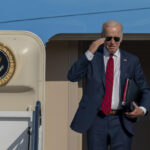
As world leaders gathered in New York City for the United Nations General Assembly, Climate Week also got underway for the 14th year. It’s the first in-person Climate Week since the onset of the COVID pandemic.
The General Assembly began last Monday and goes until next Tuesday. But this is the week that 157 heads of state and government representatives are expected to attend in person. And climate is high on the list of issues to be addressed.
This year’s Climate Week theme, like last year’s, is “Getting It Done.” U.N. Secretary-General Antonio Guterres said Tuesday that climate change and other ills have created “colossal global dysfunction,” with global warming and out-of-control emissions high on the list.
“Our world is addicted to fossil fuels,” he said in his official address to the General Assembly. “It’s time for an intervention.”
Alok Sharma, president of the 2021 United Nations Climate Change Conference, echoed those thoughts.
“Since last November when we met at COP26, the world has faced multiple global crises,” Sharma said in a statement Tuesday, flagging the Russian invasion of Ukraine as one of them.
“At the same time, the chronic threat of climate change has worsened with the devastating floods in Pakistan, which have left a third of the country underwater, one terrible example of our changing climate. … It is more important than ever that all countries deliver on the commitments we made.”
Sharma, newly minted British Prime Minister Liz Truss and other officials are representing the U.K. at both Climate Week and the General Assembly.
World leaders and environmental officials agreed last year to find ways to limit global warming to 2.7 degrees Fahrenheit, as well as curb methane emissions, replenish forests and stop deforestation. They also vowed to help those who are already seeing the effects of climate change.
Climate action leaders and activists gathering in New York City this week include representatives of indigenous groups — some of the very peoples affected not only by climate change, but also by the measures that are causing it, such as deforestation.
“We are part of the Amazon,” said Uyunkar Domingo Peas Nampichkai, a leader of the Achuar people of Ecuador.
Nampichkai came as part of the Amazon Sacred Headwaters Initiative, which works to bring indigenous peoples, nongovernmental organizations, governments and other groups to establish a protected region straddling Peru and Ecuador’s joint Amazon region.
“We know the Amazon. We live in the Amazon,” he told the Daily News.
Deforestation and issues such as biodiversity loss are tipping points that could affect the whole planet, leaders noted.
Nampichkai was part of a delegation representing 600,000 people from more than 30 indigenous nationalities in the Ecuadorian and Peruvian Amazon. They came all the way to New York City, they told the Daily News, to make sure the high-level officials attending Climate Week and the General Assembly heard their concerns.
Climate Week includes about 500 events in NYC and across the globe, the organizers said. That’s in addition to an official events program, a slew of events designed to draw attention to possible solutions.
The United Nations Development Programme (UNDP), which works to eradicate poverty and reduce inequality, has even resorted to a talking dinosaur.
“Frankie” lays it out succinctly, voiced by the actor Jack Black, in a CGI-fueled clip that evokes the current “Jurassic World” craze.




